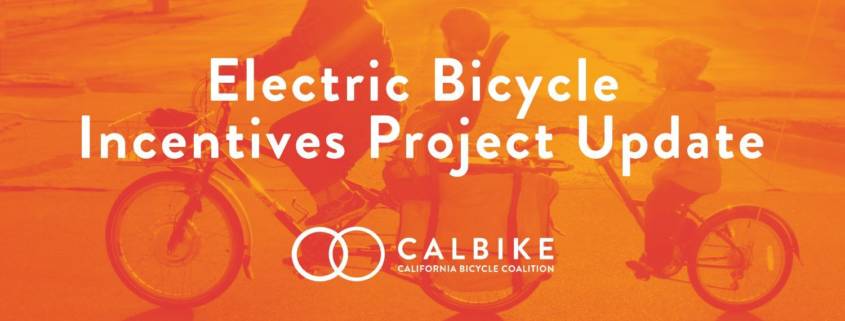E-Bike Incentives Report: November 30, 2022, CARB Work Group Meeting
The California Air Resources Board held a work group meeting to continue its discussion of the parameters of the Electric Bicycle Incentives Project on November 30, 2022. Around 150 people attended the Zoom workshop, including representatives from the e-bike industry, bicycle shop owners, nonprofits who work with potential voucher recipients, bicycle coalition leaders, and members of the public interested in the program.
Here are some highlights from the meeting, plus information CalBike learned about e-bike purchase incentives after following up with CARB staff.
More funding for implementation
At the work group, CARB announced that it has another $3 million for the program in addition to the $10 million allocated by the legislature. Program staffers anticipate that the extra funding will help augment their outreach. Hopefully, the extra money will free up more of the $10 million for incentives rather than administrative expenses. CalBike applauds CARB for finding the extra funding and demonstrating that the agency understands the value of the e-bike incentive program.
Lowered income eligibility limits, more discussion of eligible bikes
CARB staff confirmed to CalBike that two parameters for the program have been finalized: the income eligibility limits and which classes of e-bikes will be eligible for incentives.
In prior presentations, CARB proposed 400% of the federal poverty limit as the income cap for e-bike incentives. However, at the last work group, staff announced that the income limit will be lower: 300% of FPL to align the eligibility requirements for the e-bike program with those of other CARB clean vehicle programs, which will be lowered to 300% FPL in 2023.
In response to overwhelming support for allowing Class 3 e-bike models to be eligible for incentives, CARB will include all three classes of e-bikes in the program. However, manufacturers will have to apply for their models to be eligible for purchase with the vouchers.
In response to concerns about maintenance, to ensure that people who receive the vouchers have support to keep their bikes in good repair, CARB proposed requiring a manufacturer’s warranty of at least two years. That would eliminate Rad Power Bikes, which makes some of the most affordable e-bikes on the market because it only offers a one-year warranty. Commenters noted that more expensive bikes tend to have longer warranties, which might put this requirement at odds with the equity goals of the program.
A quick internet search found that many e-bike manufacturers offer a five-year warranty on the frame and fork and one year on other parts. Provisions to ensure bike quality and repairability will undoubtedly get further discussion at future work group meetings.
Next steps for California’s e-bike incentive program
CARB plans to hold another work group meeting in January to continue receiving input on program parameters. If you’re not already on CARB’s list and want to be notified about this and future e-bike meetings, sign up for CARB’s e-bike list. In the past, they sent meeting notifications to everyone interested in transportation electrification, but future notices will be sent only to the e-bike-specific list.
Of course, CalBike will also let you know about future e-bike meetings. You can sign up for our list at the bottom of this post.
Video of the 11/30/2022 meeting





